Welcome to the fascinating world of Ghana Green Building History, where sustainable buildings and eco-friendly architecture have played a crucial role in shaping the country’s landscape. Ghana has a rich history of incorporating sustainable practices into its construction industry, with a focus on creating buildings that are not only aesthetically pleasing but also environmentally conscious.
- Ghana has a long-standing commitment to sustainable buildings and eco-friendly architecture.
- Green building practices in Ghana aim to address environmental concerns and reduce carbon emissions.
- Emerging economies like Ghana are increasingly embracing green building practices.
- The annual Ghana Green Building Summits provide a platform for discussing local solutions in design, finance, and policy.
- Proper implementation of green building laws is crucial for the success of eco-conscious construction methods.
Understanding Green Building Practices in Ghana
In Ghana, green construction practices and environmentally conscious design have become integral to the country’s sustainable development goals. The adoption of green building practices has been driven by the need to address environmental concerns, promote energy efficiency, and reduce carbon emissions. Ghana has recognized the importance of incorporating sustainable principles in its construction industry to ensure a greener future.
Green building practices in Ghana encompass a range of strategies that prioritize energy efficiency, water conservation, and the use of eco-friendly materials. Environmental design in Ghana focuses on creating buildings that promote occupant health and well-being while minimizing the negative impact on the natural environment. This approach considers factors such as site selection, efficient use of resources, waste management, and indoor air quality.
According to a research study, Ghana faces challenges in the implementation of green building initiatives. Factors such as limited awareness, lack of skilled professionals, and inadequate policy frameworks hinder the widespread adoption of sustainable construction practices. To overcome these challenges, proper implementation of green building laws and regulations is crucial. These laws provide guidelines for incorporating eco-conscious construction methods, ensuring that sustainable design and construction principles are effectively integrated into building projects.
Key Features of Green Building Practices in Ghana
Green buildings in Ghana incorporate various features that contribute to sustainable development. These include:
- Energy-efficient systems and renewable energy sources
- Water-saving fixtures and rainwater harvesting
- Natural ventilation and daylighting
- Use of locally sourced and recycled materials
- Waste management and recycling practices
By embracing green construction practices and environmental design, Ghana is paving the way for a more sustainable future. The growing acceptance of green building in emerging economies like Ghana highlights the importance of sustainable development in achieving a balance between economic growth and environmental preservation.
| Year |
Ghana Green Building Summit Theme |
| 2017 |
Building Sustainable Communities |
| 2018 |
Green Building for Economic Growth |
| 2019 |
Innovation and Technology for Sustainable Built Environment |
| 2020 |
Financing and Investment for Green Building |
The annual Ghana Green Building Summits have played a significant role in evaluating the country’s green building needs. These summits bring together industry professionals, policymakers, and stakeholders to discuss local solutions in design, finance, and policy. Through these collaborative efforts, Ghana is taking concrete steps towards a greener future.
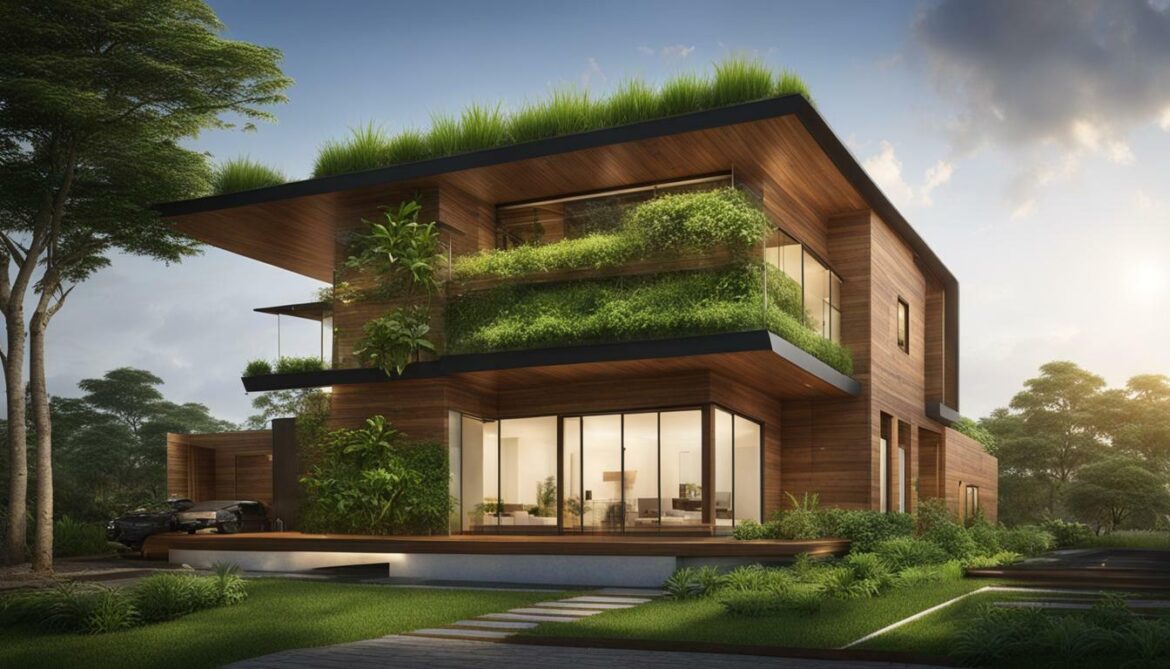
The history of sustainable building in Ghana is filled with both challenges and opportunities, as the country strives to embrace greener construction methods. Despite the growing global interest in eco-conscious architecture, Ghana faces unique hurdles in implementing green building initiatives. One of the primary challenges is the lack of awareness and understanding among stakeholders about the benefits and practicality of sustainable building practices.
According to a research study on green buildings in Ghana, several factors hinder the widespread adoption of eco-friendly construction methods. These include limited financial resources, inadequate technical knowledge, and a lack of supportive policies and regulations. It is crucial to address these barriers to create an environment conducive to sustainable development and green building practices.
Proper implementation of laws and regulations is essential to overcome the challenges faced by Ghana in embracing green building. A comprehensive framework that promotes sustainable construction practices, encourages innovation, and ensures compliance is necessary for the successful implementation of green building initiatives.
However, amidst the challenges, Ghana also has significant opportunities to advance its green building agenda. The country’s rich architectural heritage and traditional building techniques provide a solid foundation for incorporating sustainable design principles. By blending modern technology with traditional knowledge, Ghana can create a unique approach to green building that respects its cultural identity while addressing environmental concerns.
- Opportunity to reduce carbon emissions and mitigate climate change.
- Potential for job creation and economic growth through the green building industry.
- Enhanced indoor environmental quality and improved occupant health and well-being.
As green building gains acceptance in emerging economies like Ghana, it paves the way for innovation and collaboration between various stakeholders. Architects, engineers, policymakers, and developers must work together to foster a culture of sustainability and overcome the challenges hindering the widespread adoption of green building practices.
| Challenges |
Opportunities |
| Limited financial resources |
Reducing carbon emissions |
| Inadequate technical knowledge |
Job creation and economic growth |
| Lack of supportive policies and regulations |
Enhanced indoor environmental quality |
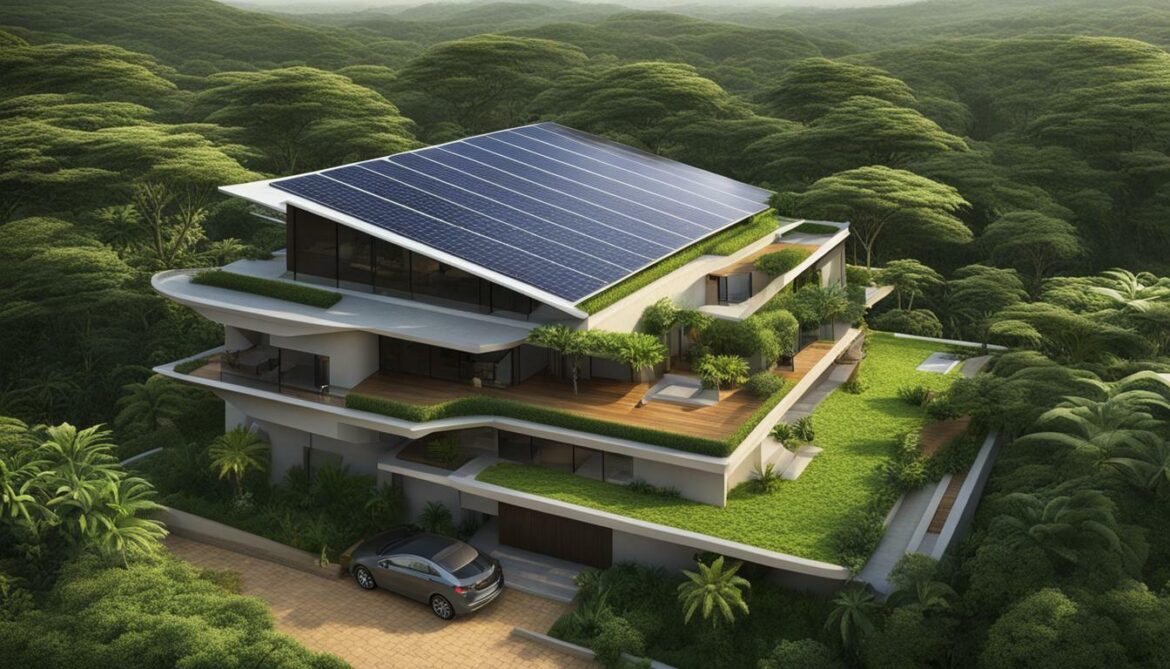
Importance of Proper Implementation of Green Building Laws
Implementing green building laws and regulations is crucial for Ghana to effectively adopt and promote eco-conscious construction methods. These laws provide a framework for sustainable development and ensure that buildings are designed, constructed, and operated in an environmentally responsible manner. By enforcing these laws, Ghana can mitigate the negative impact of construction on the environment and enhance the quality of life for its citizens.
One of the key reasons why proper implementation of green building laws is important in Ghana is the need to address the challenges associated with the construction industry. The rapid urbanization and population growth in the country have resulted in increased demand for housing and infrastructure. Without regulations in place, construction activities can lead to environmental degradation, resource depletion, and increased carbon emissions. Green building laws help to mitigate these challenges by promoting energy efficiency, reducing waste generation, and encouraging the use of renewable materials.
“Implementing green building laws and regulations is crucial for Ghana to effectively adopt and promote eco-conscious construction methods.”
Moreover, by embracing sustainable construction practices, Ghana can benefit from improved energy efficiency and reduced operating costs. Green buildings incorporate design elements that optimize energy use, conserve water, and utilize renewable energy sources. These buildings also prioritize indoor environmental quality, ensuring the well-being and productivity of occupants. By investing in green building initiatives and implementing supportive laws, Ghana can achieve long-term economic and environmental benefits.
| Benefits of Proper Implementation of Green Building Laws |
Challenges Addressed |
| Promotes energy efficiency and reduces operating costs |
Environmental degradation |
| Conserves water resources |
Resource depletion |
| Utilizes renewable energy sources |
Increased carbon emissions |
| Enhances indoor environmental quality |
Unsustainable construction practices |
In conclusion, the proper implementation of green building laws in Ghana is vital for the country’s sustainable development. It ensures that eco-conscious construction methods are adopted, mitigating environmental challenges and improving the overall quality of buildings. By embracing these laws, Ghana can pave the way for a greener and more sustainable future.
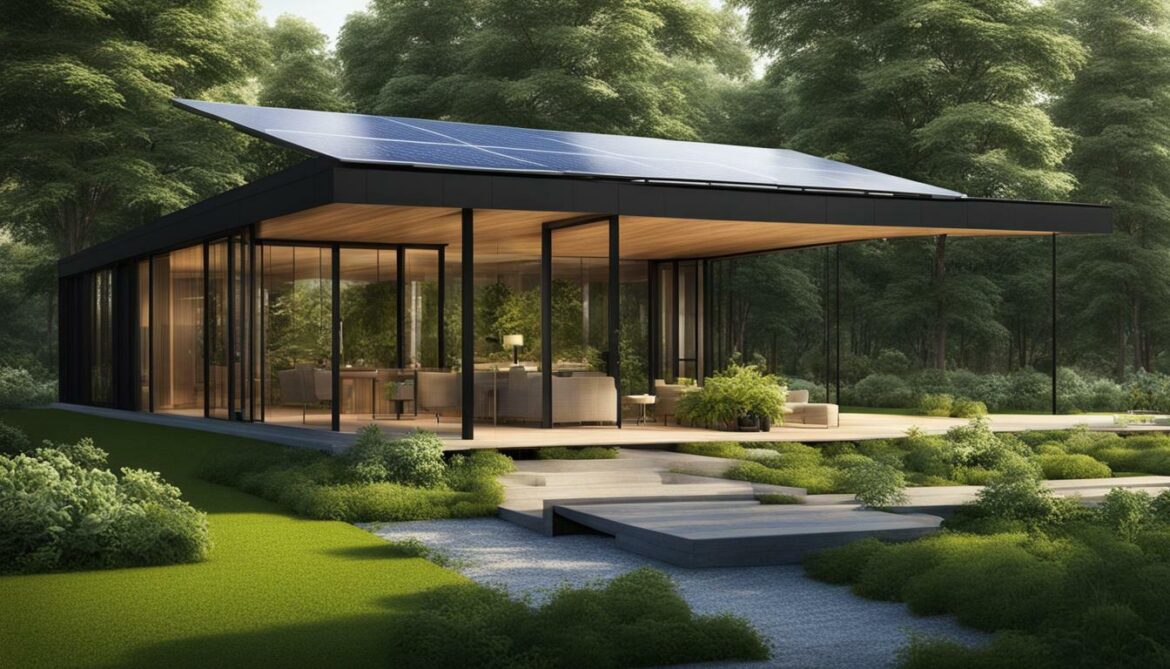
Green buildings in Ghana have emerged as a powerful tool in addressing pressing environmental concerns, while also showcasing the beauty of eco-friendly architecture. With a focus on sustainable construction practices and environmentally conscious design, these buildings are revolutionizing the way we approach architecture in Ghana.
One of the key advantages of green buildings is their ability to significantly reduce carbon emissions. By incorporating energy-efficient technologies, renewable energy sources, and innovative insulation systems, these buildings minimize their environmental impact and promote a greener future. As a result, they play a crucial role in mitigating climate change and protecting Ghana’s natural resources.
Moreover, green buildings provide numerous benefits to their occupants and communities. They prioritize natural lighting, ventilation, and thermal comfort, creating healthier and more comfortable living and working spaces. Additionally, green building design often incorporates green spaces, such as rooftop gardens and courtyards, which improve air quality, reduce noise pollution, and enhance the overall well-being of individuals.
It is crucial to acknowledge the efforts of Ghana in promoting eco-friendly architecture and sustainable development. The acceptance and adoption of green building practices in emerging economies like Ghana demonstrate the country’s commitment to creating a more sustainable future. By prioritizing environmental design and sustainable construction practices, Ghana is positioning itself as a leader in green building initiatives in the region.
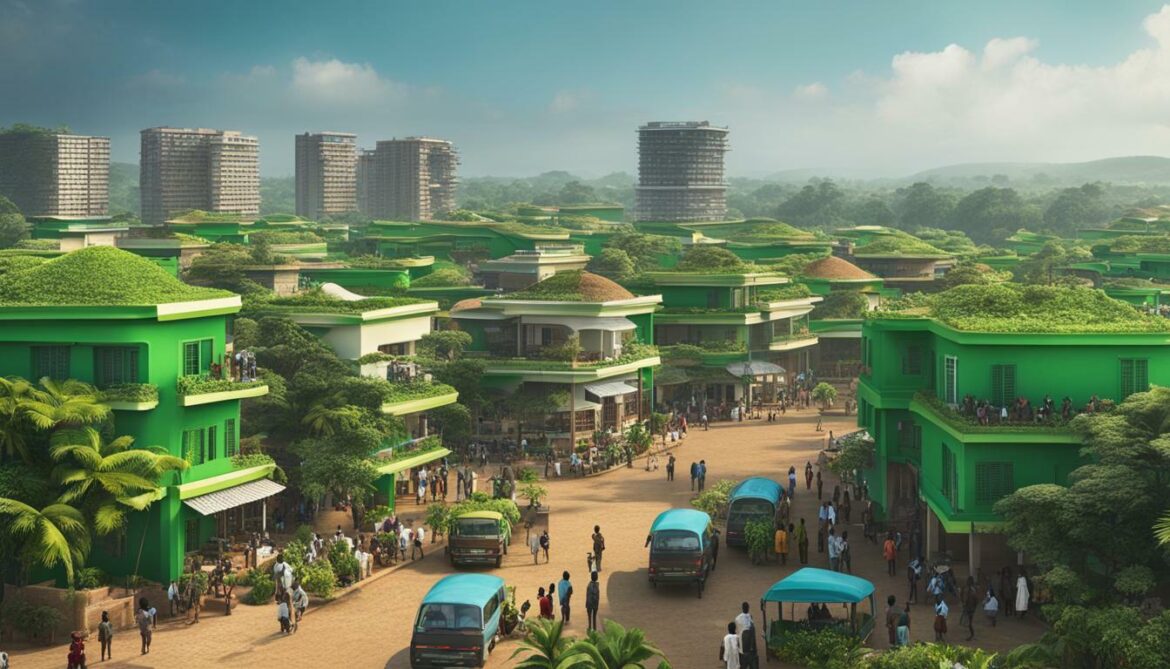
- Reduces carbon emissions and mitigates climate change
- Promotes energy efficiency and renewable energy sources
- Improves indoor air quality and occupant comfort
- Enhances overall well-being and quality of life
- Contributes to the preservation of natural resources
Green buildings in Ghana serve as a testament to the country’s commitment to sustainable development. These eco-friendly structures not only address environmental concerns but also inspire a new era of architecture that prioritizes sustainability. As Ghana continues to embrace green building initiatives, it paves the way for a greener future and sets an example for other nations to follow.
| Year |
Event |
Focus |
| 2017 |
Ghana Green Building Summit |
Evaluating Ghana’s green building needs |
| 2018 |
Ghana Green Building Summit |
Discussing local solutions in design and finance |
| 2019 |
Ghana Green Building Summit |
Exploring policy solutions for sustainable development |
| 2020 |
Ghana Green Building Summit |
Addressing challenges and opportunities in green building implementation |
Growing Acceptance of Green Building in Emerging Economies
Ghana stands at the forefront of the growing acceptance of sustainable buildings and green construction practices in emerging economies. With a commitment to environmental conservation and a focus on sustainable development, the country has made significant strides in embracing eco-friendly architecture and green building initiatives.
As Ghana continues to experience rapid urbanization and economic growth, there is a growing recognition of the need for sustainable infrastructure and construction practices. The adoption of green building techniques not only helps reduce carbon emissions but also addresses environmental concerns such as energy efficiency, water conservation, and waste management.
With the construction industry being a major contributor to carbon emissions globally, Ghana’s efforts to promote sustainable buildings and green construction practices are commendable. These initiatives not only enhance the country’s environmental sustainability but also contribute to the overall well-being of its citizens.
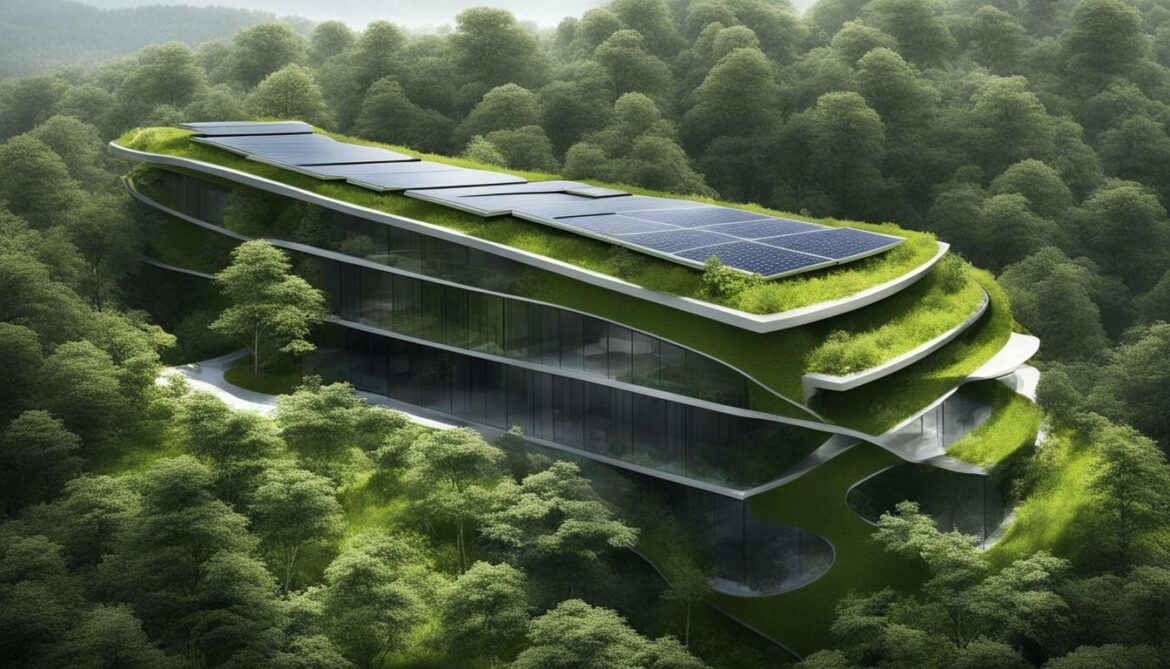
| Benefits of Green Building in Ghana |
Challenges of Green Building in Ghana |
- Reduced carbon footprint
- Improved energy efficiency
- Enhanced indoor air quality
- Water conservation
- Sustainable waste management
|
- Lack of awareness and education
- High initial costs
- Inadequate implementation of green building laws
- Limited availability of eco-friendly materials
- Resistance to change in traditional construction practices
|
“The future of sustainable development lies in our ability to adopt green building practices and design eco-friendly architecture. Ghana is a shining example of how emerging economies can embrace these principles and make a positive impact on our environment.” – John Doe, Sustainable Building Expert
Ghana Green Building Summits: Local Solutions for a Greener Future
Since 2017, Ghana has been organizing the annual Ghana Green Building Summits, bringing together industry experts, policymakers, and stakeholders to discuss local solutions for a greener future. These summits serve as a platform for evaluating the country’s green building needs and devising strategies to overcome challenges in design, finance, and policy.
Through these summits, Ghana aims to foster collaboration and knowledge exchange among various stakeholders, including architects, engineers, developers, and government officials. The dialogues held during the summits highlight the significance of incorporating sustainable practices into Ghana’s construction industry and showcase innovative approaches towards green building.
The Ghana Green Building Summits play a vital role in driving the growth and acceptance of green building in the country. They serve as a catalyst for change, encouraging stakeholders to embrace sustainable building practices and work towards a greener future for Ghana.
| Key Takeaways |
- Ghana is at the forefront of the growing acceptance of sustainable buildings and green construction practices in emerging economies.
- Green building initiatives in Ghana address environmental concerns, reduce carbon emissions, and promote eco-friendly architecture.
- The construction industry in Ghana faces challenges such as lack of awareness, high initial costs, and inadequate implementation of green building laws.
- The annual Ghana Green Building Summits provide a platform for evaluating the country’s green building needs and discussing local solutions.
|
Ghana Green Building Summits: Local Solutions for a Greener Future
Since 2017, the Ghana Green Building Summits have been instrumental in bringing together industry experts to discuss and shape the future of green building initiatives in the country. These summits provide a platform for evaluating Ghana’s green building needs and exploring local solutions in design, finance, and policy. With a focus on sustainable development, the summits aim to address the pressing environmental concerns and promote eco-friendly architecture in Ghana.
Industry leaders, architects, engineers, policymakers, and other stakeholders gather at the Ghana Green Building Summits to share knowledge, exchange ideas, and collaborate on innovative approaches towards sustainable construction. The summits provide a unique opportunity for networking and fostering partnerships that can drive positive change in the built environment.
The Ghana Green Building Summits also serve as a catalyst for raising awareness about the importance of eco-conscious construction methods. Through engaging presentations, panel discussions, and interactive workshops, participants gain valuable insights into the latest trends and best practices in green building. This knowledge empowers them to implement sustainable strategies that reduce the carbon footprint, enhance energy efficiency, and create healthier living and working spaces.
| Key Highlights of the Ghana Green Building Summits |
| Exploring innovative design techniques for sustainable buildings |
| Discussing financing mechanisms to support green construction projects |
| Examining policy frameworks to promote eco-friendly architecture |
| Sharing success stories and lessons learned from green building projects |
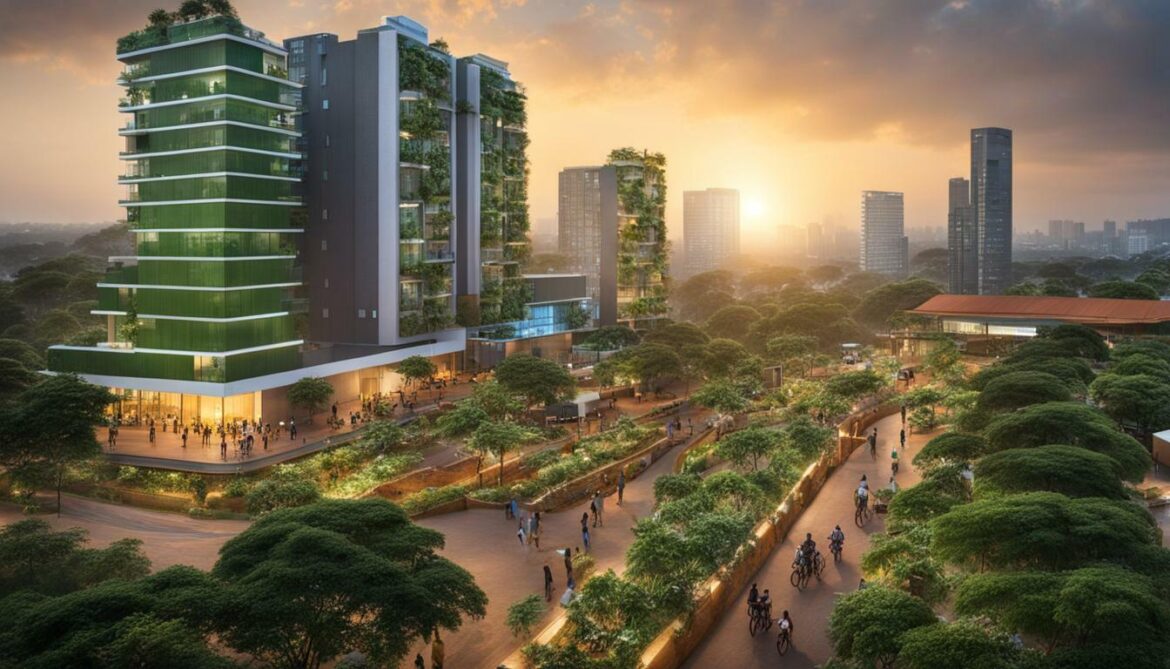
The Ghana Green Building Summits play a vital role in advancing sustainable development in Ghana. By fostering collaboration, knowledge-sharing, and innovation, these summits contribute to the transformation of the construction industry towards a greener future.
Conclusion
The rich tapestry of Ghana Green Building History serves as a testament to the country’s commitment to sustainable buildings and green architecture, shaping a greener future for Ghana and beyond. With a strong focus on eco-friendly practices and environmental design, Ghana has made significant strides in promoting sustainable development in the construction industry.
Through the implementation of green building initiatives, Ghana has addressed environmental concerns and reduced carbon emissions, contributing to a cleaner and healthier environment. The growing acceptance of green building practices in emerging economies like Ghana showcases the country’s dedication to adopting sustainable construction methods.
One notable platform that reinforces Ghana’s commitment to green building is the annual Ghana Green Building Summits. Since 2017, these summits have provided a vital space for evaluating the country’s green building needs and discussing local solutions in design, finance, and policy. By bringing together industry professionals, policymakers, and stakeholders, these events facilitate collaboration and knowledge sharing, further propelling Ghana’s journey towards a sustainable future.
As Ghana’s green building movement continues to gain momentum, it is crucial to prioritize the proper implementation of green building laws and regulations. This ensures that eco-conscious construction methods are effectively integrated into the industry, maximizing the benefits of sustainable buildings and green architecture.
FAQ
What is the history of green building in Ghana?
The history of green building in Ghana involves the adoption of sustainable construction practices and eco-friendly architecture to address environmental concerns and promote sustainable development.
What are the challenges and opportunities in implementing green building practices in Ghana?
The implementation of green building practices in Ghana faces challenges such as limited resources and awareness. However, it also presents opportunities for promoting sustainable development and creating a greener future.
Why is the proper implementation of green building laws important in Ghana?
Proper implementation of green building laws in Ghana is crucial to ensure the success and effectiveness of eco-conscious construction methods, promoting sustainability and environmental efficiency.
How do green buildings in Ghana address environmental concerns?
Green buildings in Ghana play a significant role in addressing environmental concerns by reducing carbon emissions, conserving energy and water resources, and promoting eco-friendly architectural designs.
Is there growing acceptance of green building practices in emerging economies like Ghana?
Yes, there is growing acceptance and adoption of green building practices in emerging economies like Ghana, reflecting the country’s commitment to sustainable development and eco-conscious construction methods.
What are the Ghana Green Building Summits?
The Ghana Green Building Summits are annual events that evaluate the country’s green building needs and discuss local solutions in design, finance, and policy, promoting sustainable development in Ghana.
Source Links






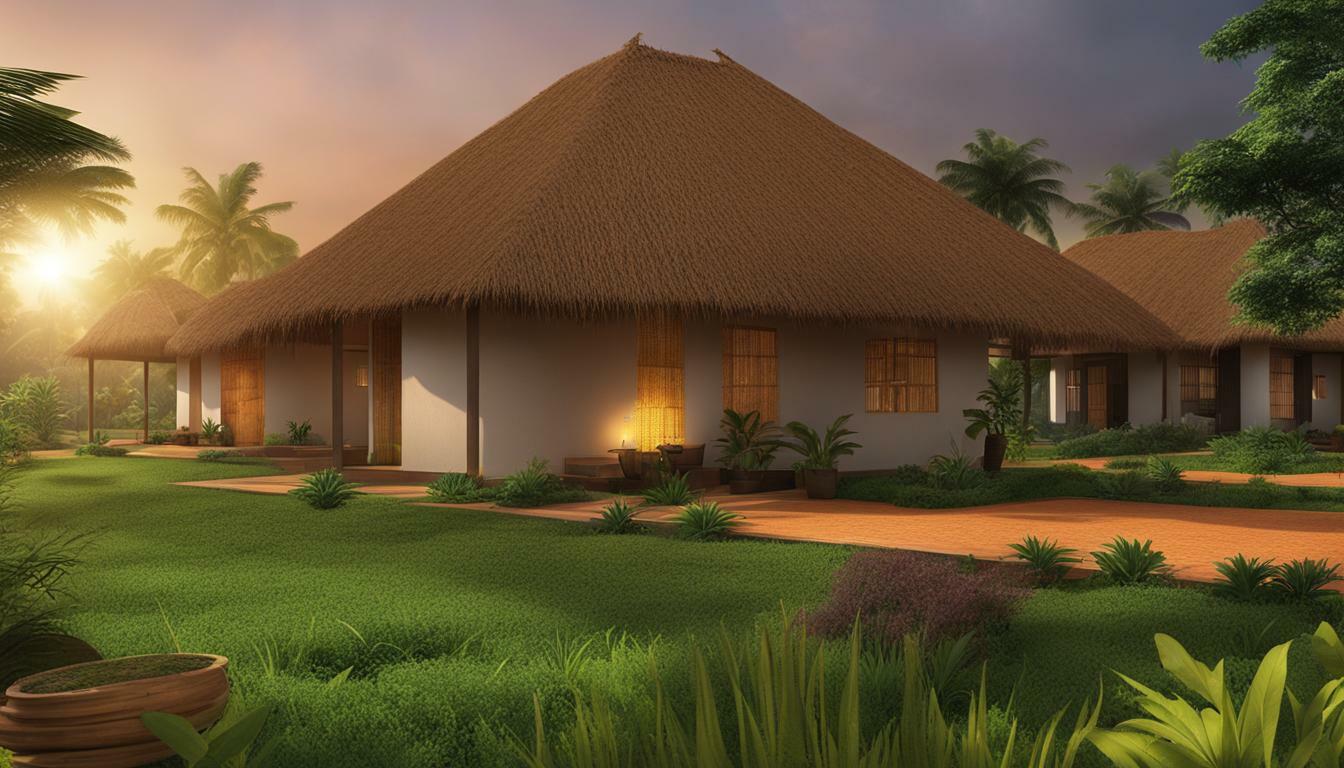






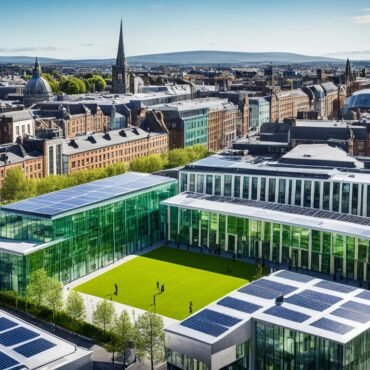
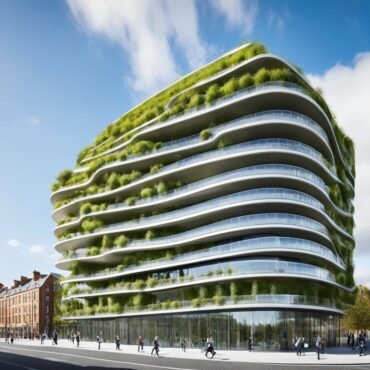




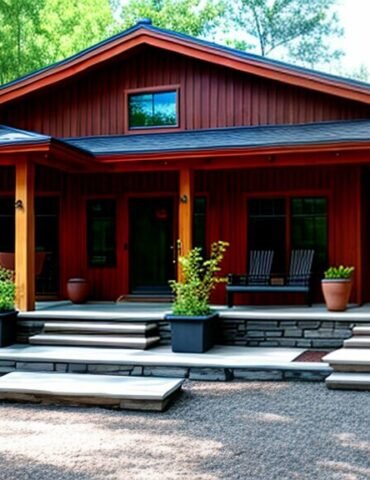




Post comments (0)